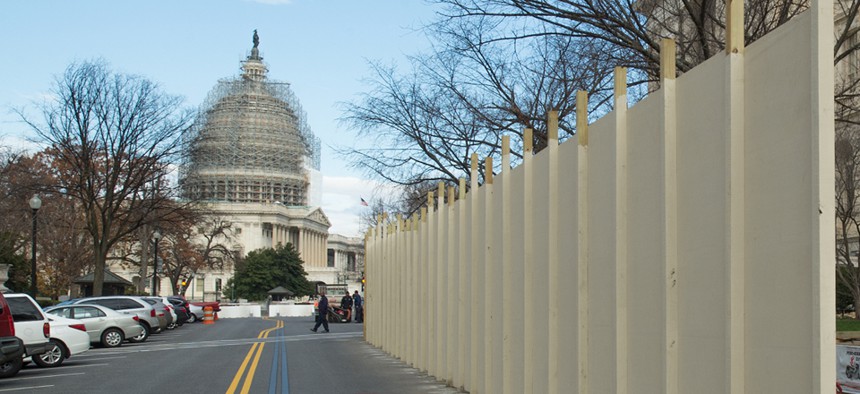
Architect of the Capitol
The 113th Congress Wasn't the Least Productive Congress Ever
The last two years were pretty slow on Capitol Hill, but they didn't set a record.
Congratulations, 113th Congress, you were not the least productive in history. But it was close.
Despite a sluggish pace for most of the last two years, a flurry of legislative activity during the lame duck elevated it to only one of the least productive Congresses in recent history.
Congress enacted 297 new laws (including the measures currently awaiting President Obama's signature). Despite predictions from many congressional observers, that is not the fewest bills enacted by a Congress since 1947. It is, however, second only to the 112th Congress, when 284 laws were enacted, according to an analysis from Josh Tauberer, at GovTrack.
"Through November, it was going to be the least productive Congress in terms of bills enacted," Tauberer said. But Congress picked up the pace during the lame-duck session, passing a flurry of bills, including the massive spending bill called the "Cromnibus."
That is not unusual, said Senate historian Donald Ritchie. He pointed to an excerpt from thejournal of Sen. William Maclay of Pennsylvania, who after the first Congress complained that several bills had been passed hastily on the last day of session.
"Nothing has changed in that sense," Ritchie said. "The legislative calendar stretches out, and then it squeezes closed like an accordion."
In terms of total votes in each chamber, the 113th Congress sits in the middle of the pack. The House voted 1,204 times to the Senate's 657. It is typical for the House to pass many more bills than the Senate, experts noted.
House Republicans have been wont to blame the gridlock on the Senate, where far fewer bills passed, and where, they note, even bipartisan bills like a reauthorization of terrorism-risk insurance or a measure spurring action on the Keystone XL oil pipeline have died.
But Ritchie said that is not entirely accurate. The Senate passed several large, bipartisan bills that the House did not take up, including measures dealing with immigration, transportation policy, and postal reform.
"None of that got through the House of Representatives," Ritchie said. "The House just had a very different way of looking at things and didn't produce their own versions of those bills."
However, Ritchie, Tauberer, and several historians and data scientists interviewed for this story noted that simply counting the number of bills passed does not paint a full picture of congressional productivity. One reason is that the trend lately has been to pass massive bills that touch myriad issues, much like the year-end Cromnibus.
"The Affordable Care Act was one bill. Naming a post office is a second bill. Are they equal? No," said Brad Fitch, president and CEO of the Congressional Management Foundation.
Based on various other subjective metrics, though, the 113th Congress was one of the least productive in history.
To delve further into the numbers, Sarah Binder, a senior fellow at the Brookings Institution, uses a different analysis. She has made note of every issue discussed in The New York Times' unsigned editorials going back to 1940—regardless of whether the editorial board was in favor or not—and compares that with the issues Congress takes up. She then assigns each Congress a gridlock score based on the percentage of the issues of the day that are not legislated upon.
The 112th Congress, according to Binder's analysis, had a gridlock score of more than 70 percent, and Binder said that although she has not yet completed her analysis of the 113th Congress, she suspects the score will be similar.
"We're basically talking the same level of deadlock. The same issues: immigration, post office reform, climate change, corporate tax reform. ... Even on Dodd-Frank repeal, Obamacare repeal … they did very few real big things in the end," she said.
David Mayhew, a political science professor at Yale University, runs a similar analysis. He makes note of legislation mentioned by journalists in articles summarizing the work of each Congress and bases that Congress's productivity on how many major pieces of legislation are enacted.
He pointed to the 113th Congress's passage of the Cromnibus, the farm bill, the Violence Against Women Act, Veterans' Affairs changes, and the Budget Control Act, but noted that this Congress's productivity was relatively, although not historically, meager.
"It's not a long list," he said. "This is a pretty low-action Congress, but it's not uniquely low."
So where does the 113th Congress stack up historically? It is not in very esteemed company.
Both Mayhew's and Binder's analyses put the 113th on par with those that were brought to a grinding halt by national crises. For instance, both experts said this past Congress enacted major legislation at roughly the same clip as the 106th Congress, the last of President Clinton's second term, which was marred by a sex scandal and impeachment.
Mayhew adds to the list the 82nd Congress, during which President Truman was guiding the country through the Korean War. And Binder's work places the 113th Congress's gridlock score not far ahead of both the 102nd Congress, during which the Gulf War started, and the 108th, when the United States again invaded Iraq.
None of the metrics are airtight, congressional experts noted. But they do explain a general sentiment among the country, reflected in protest rallies and congressional approval ratings, that the 113th Congress was not functional.
"We can use the numbers to substantiate our impressions of Congress," Tauberer said. "We know that finding consensus in the last two Congresses has been difficult, and the numbers substantiate that."







